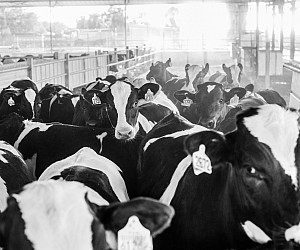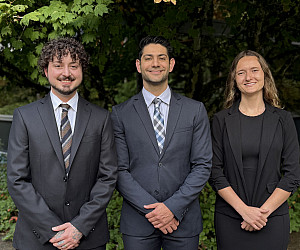Companion Animal Law Evolves to Protect People and Their Pets
Lewis & Clark sparks a national movement to protect both people and their pets by redefining the role of companion animals in the legal system.

At the intersection of family law, animal law, and social justice, you’ll find Megan Senatori—a seasoned attorney, passionate educator, and lifelong advocate for the vulnerable. As Associate Director of the Center for Animal Law Studies (CALS) at Lewis & Clark Law School, Senatori is on a mission to transform the way the legal system understands and protects companion animals as family members.
A recognized national voice on the link between domestic violence and animal abuse, Senatori recently helped co-author and pass a groundbreaking American Bar Association (ABA) resolution aimed at protecting both survivors and their companion animals. But her work goes far beyond a single resolution. Through research, teaching, and hands-on advocacy, she’s redefining what it means to protect the whole family—including the four-legged members.
“Pets Are Family”—But the Law Doesn’t Always Agree
According to Senatori, companion animal law is a fast-evolving field—and one that still lags behind public sentiment. “More than 97% of people with pets view their animals as family members,” she says. “But under the law, pets are still considered property in all 50 states.”
This legal classification carries significant consequences. In tort cases, pet owners may receive minimal compensation when an animal is wrongfully harmed or killed. In divorce proceedings, pets are often treated like any other asset. “When I practiced family law, I saw firsthand how courts would brush off pet custody disputes,” Senatori recalls. “Thankfully, that’s beginning to change.”
Eight states and the District of Columbia now have laws requiring judges to consider the well-being or best interest of pets during divorce proceedings. “It’s a sign that the law is starting to reflect how people really view their pets—as members of the family,” she says.
From Courtroom to Classroom: Teaching the Next Generation of Advocates
At Lewis & Clark, Senatori brings these issues to life for students in the Animal Law LLM and MSL programs. She teaches Companion Animal Law—a course that examines topics ranging from custody battles to animal cruelty investigations, all within the broader push for legal reform. The Companion Animal Law course is also offered in-person for JD, LLM, and MSL Students, taught by Professor Russ Mead.
“I want students to leave my class empowered, not just with knowledge but with the tools to make a difference,” Senatori says. “Companion animal law isn’t just about pets—it’s about people, relationships, and justice.”
The Hidden Link Between Domestic Violence and Animal Abuse
Senatori’s research and advocacy have focused for decades on one of the most overlooked but devastating aspects of domestic abuse: the victimization of pets, who are often caught in the cycle of violence.
“Abusers often harm or threaten pets to exert control,” she explains. “It’s a tactic that keeps victims in dangerous situations because they’re afraid of what will happen to their animals if they leave.”
That fear is well-founded. Studies show that nearly 89% of domestic violence survivors report their pets have been threatened, harmed, or killed by their abuser. Children are affected, too—one study found that 78% of children in homes with domestic violence had taken steps to protect their pets from abuse.
“These statistics are heartbreaking, but they also show us where the law can do better,” says Senatori. “Protecting pets means protecting people. It’s that simple.”
From Advocacy to Impact: Resolution 504
Senatori’s longstanding commitment to this issue culminated in 2025 when, as Co-Chair of the Companion Animal Law Subcommittee of the ABA, she co-authored ABA Resolution 504, which calls for legal protections for survivors and their pets in domestic violence cases. She also helped lead the resolution process and spoke before the ABA House of Delegates, drawing on her extensive experience as both a lawyer and a nonprofit leader.
“This resolution is about closing gaps in the legal system and acknowledging that safety for survivors must include safety for their pets,” she says. “We’ve made incredible progress, but there’s still work to do.”
Read more about Resolution 504 and how Lewis & Clark students helped make it happen →
What’s Next: A More Compassionate Legal System
Looking ahead, Senatori is focused on supporting implementation through the ABA—training judges, lawyers, social workers, veterinarians, and others to understand the role of animals in family dynamics. She also hopes to see continued legal reform around pet custody, emergency housing access, and civil protection orders.
“For so long, the law has treated animals as things,” she says. “But when we recognize that companion animals are part of the family, we also better meet the needs of survivors and we provide human and animal victims of abuse with the compassion and respect they deserve.”
Whether in the classroom, as part of the leadership team at CALS, or at the forefront of national advocacy, Megan Senatori continues to reshape the legal landscape for people and their pets—one student, one resolution, and one movement at a time.Interested in learning how you can turn your passion for animal protection into a career in law? Explore the Center for Animal Law Studies at Lewis & Clark Law School.
Law Communications is located in room 304 of Legal Research Center (LRC) on the law Campus.
MSC: 51
email jasbury@lclark.edu
voice 503-768-6605
Cell: 626-676-7923
Assistant Dean,
Communications and External Relations, Law School
Judy Asbury
Law Communications
Lewis & Clark Law School
10101 S. Terwilliger Boulevard MSC 51
Portland OR 97219
More Stories

Comparative Report to Curb the Expansion of Industrial Animal Agriculture
The analysis of how courts are addressing industrial animal agriculture in four countries is the first of its kind from the Farmed Animal Protection Project of the Center of Animal Law Studies (CALS).

Year in Review
Top Stories of 2025
As the calendar year draws to a close, we’ve compiled a sampling of top stories from the undergraduate college, the graduate school, and the law school.

Justice for Animals and the Environment on a Global Scale
The law school’s Global Law Alliance is helping to advance environmental and wildlife protections across the globe while giving students hands-on experience in international law.

2025-2026 Multnomah Bar Association Fellows Announced
Three 1ls were named as Multnomah Bar Association Fellows: Finn Johnson, Hooman Dadkho, and Christina Smith